Just being the best version of me every day
You could say that he is just one of many. One of the many great runners out there in Iten, Kenya. And in a way you would be right, Denis Kipng’eno Chirchir really doesn’t stand out at first sight. But when you get to know him better, you find out that this inconspicuous and calm marathoner is a pretty interesting person, who has a lot to say. He has been in the world of marathon just for few years, but he has already run some decent races and aims high.
–––
Congrats on your Izmir marathon few weeks ago (11 April 2021)! You finished 6th with the time of 2:12:08, only 45 s behind your PB. How was the race?
The race was good. It was a different experience all together with the cold – I’m not a big fan of running in the cold, that was the first challenge. But in general, the race was good.
And how did it feel to stand on the start line again after a while?
Pretty good. I think over the years running more races makes you not getting scared too much. But in this case, this year was different because of, you know, the coronavirus pandemic, but I felt that nothing has changed.
Let’s now talk about how it all began. When did you start running? In the primary school as it is usual here in Kenya?
Yeah. (laughter) Yeah, I started running way back, way back … it’s over twenty years, close to twenty-two.
And have you always wanted to become a runner?
Yeah! Yeah, I think from the first podium.
But I know that you had been a football player for some time – what made you stop doing football and start running?
In general, I’m a sportsperson; I’ve been into sports, and the first thing that I was genuinely interested in, was running. Football came when I was in the last year of my primary school. And then, when I went to high school, that’s where the true potential was manifested. I had played it for four years and ended up being the best player and top scorer in my school region. That made me believe that there was a talent in me playing football, and that’s when I moved to the capital city Nairobi, linked up with the current national team coach Jacob “Ghost” Mulee in his academy and that’s what persuaded me. Then I was interested in doing a football scholarship in the United States of America, more than the professional side of it. But it just didn’t work out, and – I’m a Christian myself – at some point I felt that was not what God intended me to do. If you don’t believe in God, there is a higher power, the stars themselves. If we should believe in stars, then that was not sport intended for me. You know, God, or whatever you believe, intended for me to go back to running. That’s something that I did from my young age.
So since when can you call yourself a runner?
I can't say I have been a runner for a long time. It depends; professionally or doing the most professional things or the most race specific sessions – ten years ago. But I have been a runner all my entire life. I first earned my money when I was eight years old. It was not so much anyway; it was like three dollars. That was a lot of money and a big deal for me back then. That was 1998.
So, you are a professional now – do you have any sponsors?
Yes, I am sponsored, not financially wise but more like training gear. I am managed by Volare Sports, who are affiliated with Adidas.
What are the pros and cons of running? I guess that you’ve had to sacrifice quite a lot, but has it also given you something?
I think in everything in our life, not necessarily in running alone – discipline, consistency, dedication are the most important things. This is the sport that I love, so the pro that I can say is it is satisfying for me. I feel good when I run. Training-wise, racing-wise, no matter the results, it makes me feel good. Looking at the cons, I don’t think I have ever experienced any cons.
Have you been focused on marathon ever since or did you start with any shorter distances?
I started as a sprinter. When I went back to running again in 2011, after I had to forego my football ambitions, I started as a sprinter in 800 meters, and that’s what I did for four years before I decided to focus on 1500 m and 5000 m. But I did my first marathon in 2014, which I intended to do as a long run – at least until 30 km – in preparation for the next track season. It turned out to be an eye opener. It showed I had enough endurance to go all the way in. It was a strong feeling and that’s when I decided to really start focusing on marathon from the end of 2014. And I started 2015, focusing more like 1500 m and 5000 m, but my mind was entirely convinced that I was going to do marathon. And that’s when, in 2016, I decided to fully focus on marathon and despite the minimal training hours managed to do another marathon in 2016, despite training as a sprinter.
That’s cool! You have told me earlier that your first big event was when you paced the Prague marathon back in 2017 – how did you get the opportunity?
The opportunity came through a friend, one of my very best friends, who has created endless ripple for me. We met when I was coaching football team in my home in a certain tournament sponsored by a milk company, the Kenya Cooperative Creameries, and I beat his team. And I think that the team from his region had some of the most talented players I’d ever seen compared to us; my team was more like just a collection of, you know, just some guys. So, when I beat his team, that’s when it changed. He was so curious to know my background, and we started our relationship. But back then I was also training slowly in 2011, 2012, and that’s when he got interested. And when I started getting stronger and faster, he passed my information to another agent who was looking for the RunCzech program in Iten. And that’s when they supported me, and they invited me for time trial, which was overseen by my current coach Renato Canova. And that was a success for me, I signed with them, and after that I went to the Prague marathon as a pacer.
Is Renato Canova’s approach specific in any way? How does it work with him – does he live here in Iten, do you meet sometimes? How often do you get your training plan?
Canova spends most of the time in Kenya. With the pandemic unfortunately though, he hasn’t been here; he is in Italy, but he should be back after the Olympics. So, he sends the program through Julien Wanders, my training mate and my team leader. And that’s when we execute the program that he sends.
Have you been training with Canova since beginning or did you have another coach before?
I first came to Iten in 2017, so I was using another program. And then in 2018 towards the end, I started training with Jake Robertson and we used his program, which was a very good program. And 2019 in June, that’s when I joined Julien’s program. Renato Canova was not his coach then, he had his coach from Switzerland, Marco. I used his program, most of the sessions anyway were not so bad, but it was 10k and half marathon focused. But yes, it somehow served my purpose as a marathoner, too.
What is your training based on? I guess that you just use your feelings and follow the program; no heartrate monitors or anything like that.
No, no. (laughter) I think, to be honest, and no disrespect, most of the East African athletes, we don’t use the heartrate monitors. We don’t follow the parameters like the heat or cold … no, we just go there with the feel. I think the best way to predict how you feel is your own body though. So, we don’t use the monitors that much … no, not at all anyway. Even in the watch, the only thing we’re using is the pace and the distance and time, and that’s it.
You told me that you train with Julien – are there any other big names in your training group?
Yeah! (laughter) Yeah, there are big names in our group. We have Julien Wanders himself of course, we have Amanal Petros from Germany, who is a German national record holder. We have a Kenyan Eric Kiptanui, who ran one of the world’s leading half marathons – 58:42 back in 2018, he has run 2:06, 2:05 (for marathon); 2:05 recently in Siena (11 April 2021). And we have more good guys, very talented: we have Alex Kibarus, who paced the second fastest women’s half marathon in Delhi, we have his brother, Matthew Kibarus. We have Bernard Chesop. We have very fast upcoming guys too, they’re pretty talented. Also, last few months Jake Robertson has joined, the New Zealand national record holder for marathon. We have guys coming in the group almost all the time, so yes, it’s a strong group. We have Djilali Bedrani and we have Jimmy Gressier, the road 5k European record holder, who both would join sometimes when they are in Kenya. But we have our own stable core group too, who are very fast and talented guys and who I want to watch in the few years to come.
Do you run on your own sometimes?
Yes, I do. Especially after my races or the marathon, I do run by myself for two, three days or a week at times. And at times, when in the sessions maybe I feel a little bit of tightness somewhere, I may have to run alone.
What are the most important workouts for you and what are your favourite ones?
There is no singular specific session that I can say is favourite for me, but I think for me it’s track, because I started running as a sprinter. I love track, I love speed. There is no specific workout I can say is the best, but track is the favourite for me, because you still must find the right balance anyway.
How many kilometres do you usually cover per week? And what is your yearly mileage?
I’ve never done the yearly mileage, but I think just doing average of at least 200 km weekly, that’s 800 a month. But you have to subtract at least three weeks every three months circle, so … it’s pretty low. (laughter) Weekly, I do average of, let me say 180.
That’s a lot. What do you do to prevent injuries, how does your regeneration look like?
More recoveries, sleep, gym, core workouts … that’s the most important thing. Right nutrition, lots of water and, most importantly, most important is to have peace of mind. It’s all about controlling the controllables and letting everything else flow. So that’s how you prevent injuries.
Which performance are you the proudest of? What are your best running experiences?
I can say the best experience for me was Los Angeles. (8 March 2020) I went there with no marathon-specific sessions. I had a lot of speed, and the course was also one of the toughest. And for me it was also unpredictable, it was my first time, I didn’t know. And I ended up running my current PB (2:11:22).
What are your goals for this year and what are your long-term dreams?
Short-time goals first: for me it is hopefully I get to run sub-2:10 marathon before the end of this year. And hopefully maybe a fast 10k or a fast half marathon. Long-term goal is definitely to run sub 2:06 and to be one of the best, best of the best in marathon running.
That’s nice! How do you keep yourself motivated, especially during these covid times?
Just being the best version of me every day. Trying to beat my previous time or maintain the same time, that’s what motivates me. And not to let my performance drop; just to become the best version of me, that’s all.
Do you have a mental coach, too?
No, I don’t.
So, you rely just on your positive mindset and your friends?
Yeah. I believe that the experience I went through life before is what has made me to be where I am right now. If you’d asked me five or six years ago, I would need a mental coach. But my life has not been so smooth in terms of running career, and even outside running. So, looking at it now in retrospect, that’s what has made me what I am. I believe I’m more mentally tough than before, but of course, you still need people to keep motivating you and talking to you, you need to talk to someone.
Who does inspire you? Is there any role model for you?
I don’t have one in the running field, but more in the football field. One is Ryan Giggs. His longevity and playing into his forties was one of the best motivations or mentors that you want to have, specially that I wanted to be a football player. He played deep into his forties, and I want to, hopefully, have this longevity in my field. Of course, it is also Cristiano Ronaldo now. He is 35 years old but if you look at what he is doing, it’s extraordinary, and you want to be there at that age. Of course, he has achieved what I’ve not achieved, but hopefully there is more to come for me, and I know there is more to come for me. So, Ryan Giggs and Cristiano Ronaldo. And Zlatan Ibrahimović; again, for his longevity and being able to perform even at this age.
What do you think it requires to be a successful runner?
I mentioned that: discipline, hard work and consistency; these are the keys. And trust in the process, I think.
And what do you think is the reason that Kenyans and other East Africans are so good? What is the difference compared to Europeans or Americans?
First of all, this is the only way out of the poverty. And I cannot say that is the main, main, main key; things be happening for a reason, because sometimes you need to go through the worst and the baddest moments to bring out the best of you. So, I believe it’s the talent that we have, and the dedication that we have, and the experience that we have going through challenges. The fact that we are really wanting more, and this is the only source of our livelihood and source of passion, and talent. This is what makes us unstoppable and wanting it more than athletes from other parts of the world. But you can also see that the other athletes are catching up, because it’s a passion for most of them, they’ve been inspired by East African athletes, they want it, and some of them are really good, as Kenyans and other East African athletes. So, it’s the fact that we want it more.
I think that you want to run for as long as possible, but one day you’ll probably have to stop – do you know what you would like to do then? Would you like to become a coach?
I think I have to plan it. I don’t want to be sitting down after forty in the house, fighting over the remote control with my kids. (laughter) Yes, I’ve already thought about it, there are some options that I am looking into – coaching, punditry, …
What does your usual day look like? Run in the morning, then rest, run in the evening, and that’s it?
Yeah, I can say I’m one of the most boring stud you’ve met (laughter) – boring in quotes –, but for me it works. So, it’s waking up in the morning, run, come back, tea – mostly with the group, sleep a little bit or do some cleaning, lunch, sleep a bit, gym, evening training, dinner. That’s the cycle.
What do you do in your free time? Except of sleeping …
Aside from sleeping I do watch movies or some stuff, or I read some books.
Do you have any favourite book or movie?
I have no favourite book so far, but I love reading Shakespeare stuff, especially the books that I read back in high school as my set book, the Merchant of Venice. So, I like reading it, and then poetry.
Wow, cool! I wouldn’t expect this. And what is your music taste? Is there any song that motivates you?
Yes, my favourite is country music, of course. And at the same time, I love hip-hop, I love Chris Brown. And I also love the Kenyan music, the old-school I grew up with – I listen to it most of the time.
As we are talking about favourite things, what about food and drinks? What do you usually eat to recharge the energy needed for running?
Mostly lunch for me is peas and chapati or ndengu and chapati – that’s what fulfils me for lunch. Dinner mostly is ugali and goat meat at least three times a week, mostly after the hard sessions. And dinner also, when it is not meat, it is ugali and cabbage or ugali and the traditional Kenyan vegetables managu.
And what is your favourite?
Goat meat. (smile)
I think we’ve come to the end. Is there anything else you would like to share? Any interesting or fun fact about yourself, or any message?
No, I don’t think so. (smile) Better when you ask.
Then I thank you very much for this interview, and wish you good luck, may all your dreams come true. Take care.
Thank you, thank you so much.
–––
Iten, May 2021
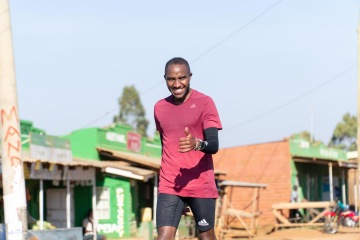
“Running makes me feel good.” Photo © Daniel Vandas
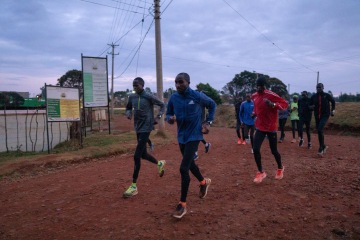
Leaving the meeting point before dawn. Photo © Daniel Vandas
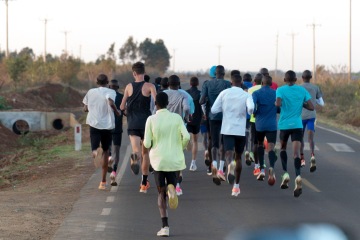
Team work makes the dream work. Photo © Daniel Vandas
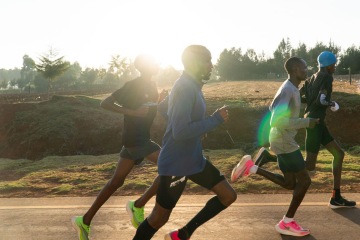
Morning run with the group. Photo © Daniel Vandas
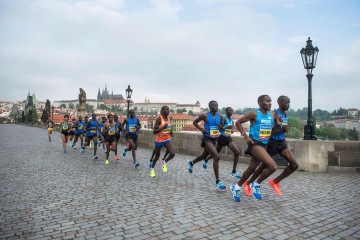
On the course of the Prague marathon 2017. Photo © RunCzech
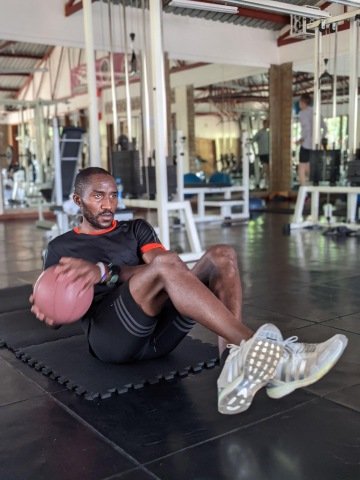
Afternoon gym session. Photo © Tomáš Křivda
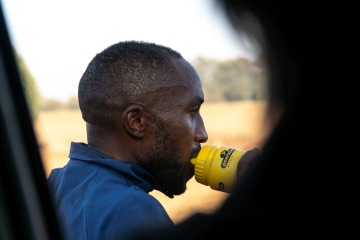
Hydration is key. Photo © Daniel Vandas